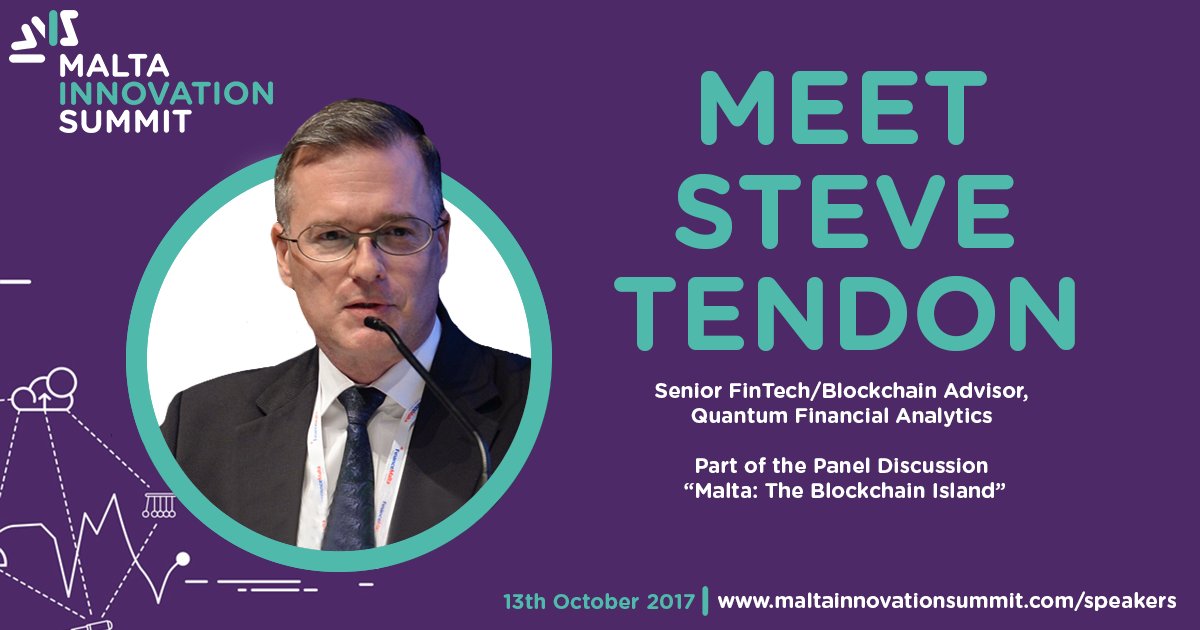Steve Tendon Speaks about the Blockchain Island at the Malta Innovation Summit 2017
On October 13, 2017, Steve Tendon was part of the panel discussion “Malta the Blockchain Island”, brilliantly moderated by Patrick Young, at the first Malta Innovation Summit.
 .
.
As the original author of Malta’s National Blockchain Strategy — the document approved by Malta’s Cabinet of Ministers in April 2017, and wherein Steve created the vision and coined the very term of “Blockchain Island” — Steve expressed very strong opinions on the topic, often in contrast with the other panelists.
 Image credit: Liesbeth Oost
Image credit: Liesbeth Oost
The following is a summary of the key points made by Steve.
It’s not the island, it’s the unconquered space in the crypto-sphere
The first clarification is that in the original vision the term “Blockchain Island” did not refer to the Maltese archipelago in the Mediterranean. The term was used to identify a new space in the crypto-sphere, that Malta would set out to conquer as a first sovereign jurisdiction venturing into that space.
The current state of the Blockchain can be compared to the state of the early years of aviation. Nine years after the Wright brothers proved that human flight was possible, Louis Blériot flew across the English Channel. A pioneering era started. Many entrepreneurs and nations started exploring the technology and trying to extend its limitations. It was an arms race to conquer the airspace. It meant both business power and military power.
Likewise today: a few years after Satoshi Nakamoto’s breakthrough work with the Bitcoin Blockchain giving the world a decentralized medium for storage of value, and Vitalik’s Buterin equally ground breaking work with the Ethereum Blockchain providing decentralized execution of logic, we are entering a pioneering era. Entrepreneurs and nations are exploring Blockchain technologies, and testing their limitations. It is an arms race to conquer… Well… what, exactly?
Less than two weeks ago, on October 4, we celebrated a landmark event: the launch by the Soviet Union of the Sputnik, 60 years ago, in 1957. The first human built object to fly in outer space. This event changed history. The United States, all of a sudden felt vulnerable. They understood that all their might in airborne fire power, could nothing against an attack that came from outer space. The race for space flight was inaugurated.
Today, most jurisdictions dabbling with Blockchain technologies are similar to those first airplane pioneers. They are trying to figure out which shape of a wooden propeller is best; if one, two or three wings provide the best lift; if the rudder should be in front or behind.
Believing that the Blockchian Island is a physical jurisdiction that gives regulatory cover to Blockchain technologies is akin to experimenting about which is the best way to engineer an aircraft. Doing that, is necessary, of course. But it is not sufficient, given what is potentially at stake.
The vision of the Blockchian Island being a virtual jurisdiction, that claims a yet unconquered space — a space in the crypto-sphere — is similar to the Soviet Union’s conquest of outer space.
The first jurisdiction that will claim this space — whether that will be Malta or any other one — will effectively become a new kind of superpower: It will become the first crypto-economic superpower.
Unsustainable, unambitious, and obsolete frames of reference
Despite this potential, all initiatives that can be observed — whether in Malta or in other jurisdictions — are more similar to carving the best wooden propellers than to engineering rockets to conquer the next space of economic hegemony.
There is no understanding, appreciation, let alone ambition to conquer that space.
It is understandable. Malta, as the case is, has been extremely successful in the past at attracting businesses from abroad through legislation and regulation. The entire financial services sectors, the iGaming sector, and the maritime sector — just to name the most prominent ones — are all based on that business model. It comes as totally natural to “rinse and repeat” and to apply that thinking to the emerging sector of Blockchain technologies.
Undoubtedly, Malta has the potential to be very successful in doing this; but why go for airplanes, when there is so much more to gain if the target were set more ambitiously to claim jurisdiction in the crypto-space?
Furthermore, it is unfortunate, that such a business model is not even sustainable for this little island. The disastrous situation of the daily traffic jams make it extremely clear that any attempt at physically bringing more people to this little rock just cannot continue. What is needed is to have the guts to “Think outside the Rock.” (With apologies to Edward De Bono.)
Setting out to become a crypto-economic superpower would bring to Malta an unprecedented level of wealth, in comparison to which the sum of its current financial services, iGaming, maritime and all others would dwarf.
This is not about bringing businesses to the island. This is about the island creating a crypto-island in the crypto-sphere; with such an advanced crypto-legislation that it would naturally attract businesses to join. It would be very similar, in a way, to what Estonia is currently doing in terms of E-Residency; only that it would be at a much higher level of ambition and realized entirely through crypto-technologies.
Malta would simply be the physical capital of a new virtual jurisdiction, that could count hundreds of millions of citizens and several million new businesses, bringing orders of magnitude increase in the country’s GDP. Is the ambition there to go for it?
It’s not about private DLTs, but about real Blockchains
There is a lot of hair-splitting going on about making distinctions between public and private Blockchains. The ambitious vision cannot be concerned with private distributed-ledger technologies. They are still aricraft technology, even if advanced. (Think like jet-engines rather than propellers).
The opportunity to become a crypto-economic superpower is afforded to the country entirely by true Blockchain technologies, which are those that feature some distinguishing traits. Namely:
- Being universally accessible, and
- Being censorship resistent (and all variations thereof, like: tamper-proof, immutable, etc.)
Distributed ledger technologies (DLTs), as much as they would like to qualify as Blockchains, are effectively just glorified databases which offer technical advantages but none of the socio-political implications of true Blockchains. DLTs need no reforming or new laws. They are wonderful optimizing technologies, that can remove a lot of friction between interacting parties, speed up transactions, etc.; but hey have no weight in term of enabling the virtual Blockchain island.
On the other hand, true Blockchain technologies require innovation in jurisprudence beyond what has ever been conceived of today. The conventional way of thinking is to “fit” innovations into existing laws, and maybe tweaking them. They always refer to a situs. They cannot conceive that something is truly border-less, and cannot be reached by the physical arm of the law.
The innovative ways of thinking is to reverse the direction of that transformation: to imagine ways whereby legislation can reach out to the border-less crypto-space and offer legal constructs, in essence represented by a body of smart contracts.
Beware: current Blockchain technologies are not there yet! But this is a field of research that is moving extremely fast. Third generation Blockchains are already popping up on the radar screen of the attentive observer; and they will enable the building of this body of smart laws.
Enlightened policy making, and enlightened self-interest
The institution of a virtual jurisdiction cannot enforce citizenship, as when you are born (via ius soli or ius sanguinis). This raises the bar incredibly, as the body of smart laws need to be so attractive that virtual citizens will actually want to join. How can this be achieved?
Satoshi Nakamoto has already outlined the way. It is through enlightened self-interest that people will join. The entire Bitcoin Blockchain is basically sustained by the greed of miners; but that force — human greediness — is directed towards the up-keeping of the entire construct. It is by creating win-win propositions that cater for each individual’s self interest that viral spread can be achieved.
The innovation of Satoshi Nakamoto is not only an engineering feat, it is also a feat of social engineering. And that is what is needed too.
It’s not about business, it’s about unprecedented socio-, economic- and political changes
While there is no doubt that the Blockchain Island — this virtual jurisdiction in the crypto-sphere — will attract an unprecedented level of business and wealth, it will also be a place where the fundamental social contract changes at the root.
By adopting self-sovereign digital identity systems — which would underlie not only all public services, licensing and accreditation, and KYC needs — effective foundations are being laid to enable effective direct democracy.
The economic lever of the trillion dollar business that will move through Blockchain technologies in the coming years, and to the attracted pro-rata of which the virtual jurisdiction can claim taxation and other fees, will allow the virtual jurisdiction to sustainably afford universal basic income to all of its physical and virtual citizens. Which government would want to ignore that chance? And which person wouldn’t want to be a citizen in that jurisdiction?
Final reflection
Undoubtedly, Malta has high ambitions, compared to the other pioneers of this field. Yet, as successful as the country might be in this new venture, it seems it will excel in building the best wooden propeller.
Some other day, someone else will come along, and build a Sputnik. It would be a shame to let the opportunity pass by, without even being aware of it. Hopefully, you are aware of it now.
The Blockchain is a Weapon of Mass Prosperity. Who will have the guts to deploy it and pull the trigger?
